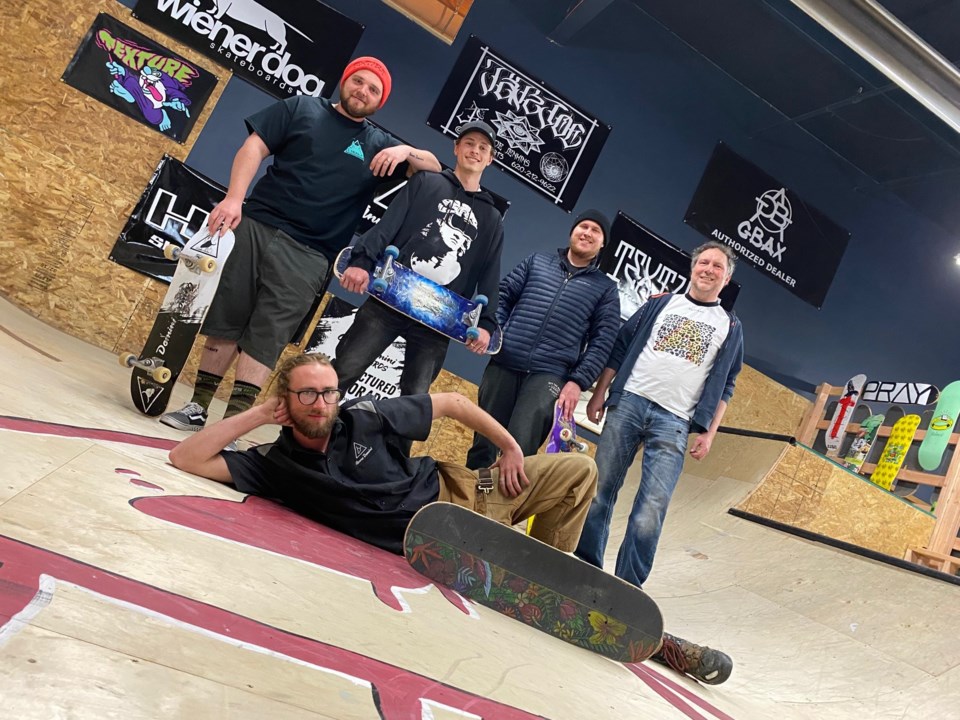The founders of Anno Domini Skateboards have designs on Longmont being the skateboard manufacturing capital of the United States.
And, based on the way things have come together for the nearly 4-month-old company, smart money wouldn’t bet against them.
Anno Domini at the end of last year began manufacturing skateboard decks under its own brand, as well as for eight national brands and a few smaller ones, too. Non-disclosure agreements prevent the company from naming its heavy hitters, but smaller brands include Hux Skateboards, GBax and Fiancé.
The COVID pandemic has proven a blessing and a curse for the new kid on the block, creating a shortage of raw materials such as Canadian maple and glue, but also driving orders to a 10,000-board backlog.
The founders have faith the supply chain issues will be resolved and the company can ramp up production to 5,000 boards per month in the next month and 20,000 per month in the next six months.
Founded in faith
Faith is key to all Anno Domini does and the work of a higher power is already part of its origin story. A lot of stars aligned to make the company a reality, which CEO David Harvey calls God at work.
“It was crazy because through this entire journey we kind of can see how God’s working,” said Harvey, who arrived in Colorado after shuttering his Ohio skate shop and driving until he landed in a Planet Fitness parking lot in Westminster.
Skateboarding, Harvey said, is very “rough edges, let’s get drunk, let’s get high … and that’s not what our company is really about. Our company is how we can show people that they can have fun in a different way and in a more positive manner.”
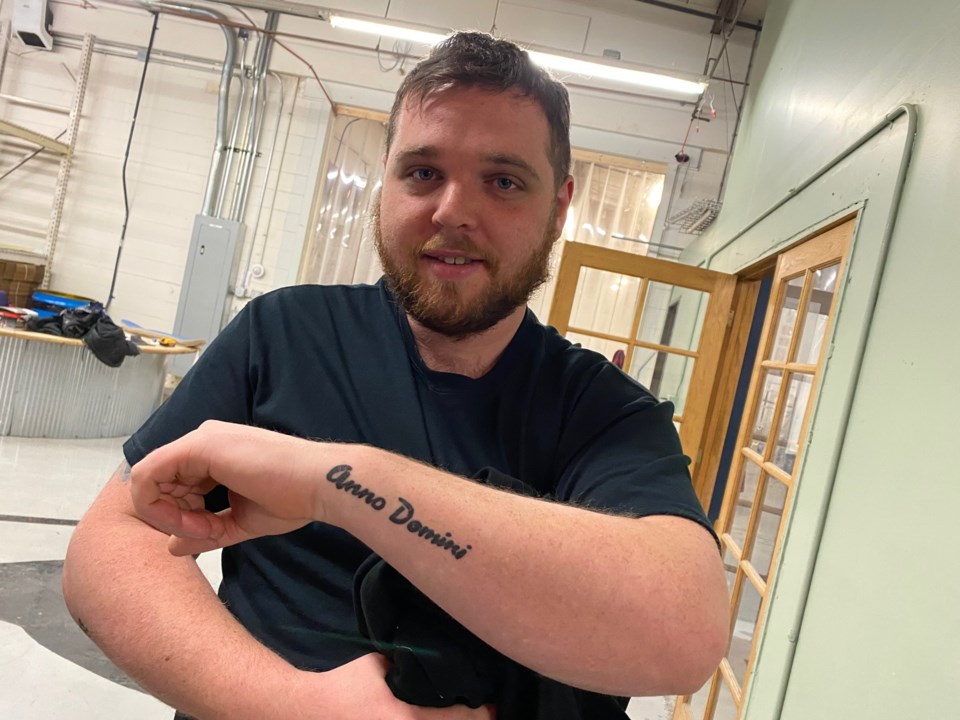 Anno Domini Skateboards CEO David Harvey. By Julie Baxter
Anno Domini Skateboards CEO David Harvey. By Julie BaxterThose people not only include brands looking for Anno Domini boards but big names in the sport including Bryant Chapo, for whom the company is making a board. Anno Domini also is making boards for actor Jaden Smith, who might be better known as his famous father Will Smith’s son, and professional boarder Brent Atchley, among others.
It’s also drawn some of the sport’s icons, including, skateboarding great Andy Roy who lived a drug- and alcohol-fueled lifestyle before finding his sobriety; and Uriel Luebke, a Longmont resident and professional rider who, after getting sober, founded the now-closed Skatuary indoor skatepark in Sheridan, and is now a member of Anno Domini’s professional team.
“(Roy is) coming out every month now. He is one of the biggest names in skateboarding, the dude’s a legend, everyone knows him. And he’s not coming back because of skateboarding. He’s coming back because he wants to be around a positive community in skateboarding,” Harvey said.
Skaters also are drawn to the company for its indoor ramp, dubbed The Ramp in Longmont, and its positive vibes. At a grand opening for the ramp on March 6, they turned out in droves, about 200 in all and all of whom were COVID screened.
Roy was among them and was a favorite among the skaters who came from all over the state and even the country to be part of the celebration. Leading a parking lot game of SKATE — think the basketball game HORSE but skate tricks instead of trick shots — at the festivities, Roy encouraged the crowd to try something new: “That’s what skateboarding is all about — doing something you’ve never done before.”
Monthly ramp events are now part of the company’s plans.
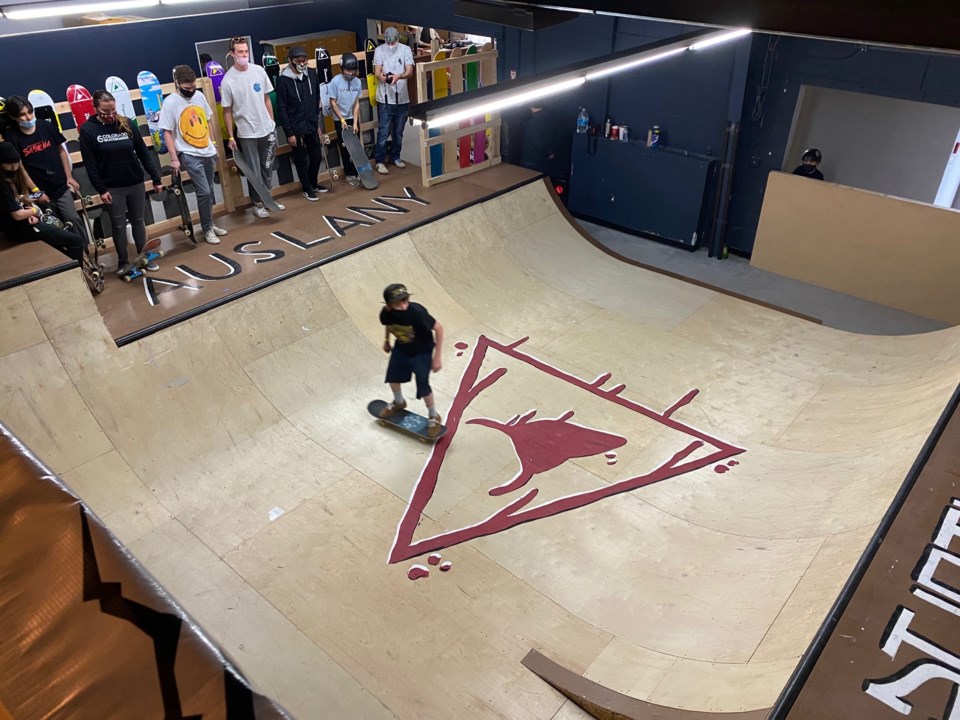 Skaters try out The Ramp in Longmont at the grand opening celebration on March 6, 2021, at Anno Domini Skateboards. By Julie Baxter
Skaters try out The Ramp in Longmont at the grand opening celebration on March 6, 2021, at Anno Domini Skateboards. By Julie BaxterBuilding boards and a dream
The foundations of Anno Domini — which translates to the year of the lord in Latin but is more commonly known as after death, or AD in shorthand — are firmly embedded in friendships old and new.
Started by Harvey and Conor Pepin in March 2020 as a company that applied graphics to decks (the actual boards of skateboards), Anno Domini evolved to a manufacturer during the “great COVID board shortage of 2020.”
The evolution from graphics company to skateboard maker started with their supplier in Alabama, South Central Skateboard Manufacturing, being unable to supply enough decks for their growing graphics business.
That presented Harvey and Pepin with a choice, close it down and end their two-month journey that had turned cash flow positive after an initial investment of $22,000 or do something more.
“I was like Conor, we need to press wood and his first response was just ‘nope,’” Harvey said.
That hesitancy — or maybe outright refusal is a better term — was based on the investment it would take to make it happen, said Pepin, Anno Domini chief operating officer.
“We looked at the numbers and it was like a $2 million investment,” he said.
Manufacturing boards requires hydraulic presses, an industrial glue spreader, a heat transfer press, sanding equipment, machinery to cut the shape of the board, a spray booth and space for all of it, Pepin said. The only thing they had was a heat transfer press in use for the graphics business.
“It’s an extremely sizable investment,” Pepin said. “It’s extremely risky and, at that time, we didn’t have money.”
Enter that higher power.
The duo was subletting an office and met Dennis Moulton, a former Microsoft executive and now owner of Auslany Apparel, who helped them come up with a 100-plus-page business plan and connected them with a potential investor. After a trip to California, during which they also toured a skateboard manufacturer to see an operation from the inside, they had three offers on the table but needed an IT plan.
Turns out the higher power had a plan for that, too. David Mans, who Harvey met at Boulder Valley Church of Christ, had a background in IT. Mans is now an investor in and chief technology officer for Anno Domini.
Mans investing was not the intention but rather just another example of God at work, Harvey said.
The equipment and the guy to run it
Plan in hand and investors and space secured, Anno Domini in September moved into its space at 455 Weaver Park Road. The building not only includes the manufacturing operation but also a skate shop and The Ramp in Longmont.
But they needed the equipment.
God had a plan for that, too. All of the machinery Anno Domini needed was sitting in a Denver garage after the 2019 closure of manufacturer and skate shop, BOARDLife.
The only piece of equipment that was broken was the heat transfer machine, and the only piece that was missing was the paint booth, both of which Anno Domini already had.
Head of production Austin Burr, also known as AD’s head chef, was among the employees of BOARDLife left heartbroken when it closed.
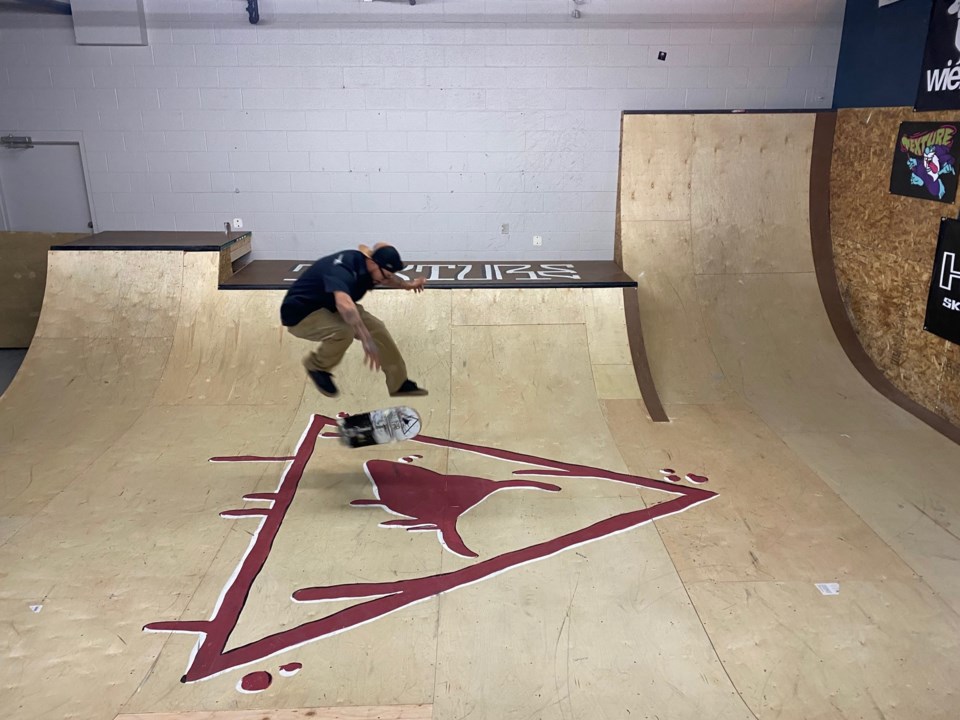 Austin Burr, head of production at Anno Domini Skateboards, takes a run on The Ramp in Longmont, before the grand opening celebration on March 6, 2021. By Julie Baxter
Austin Burr, head of production at Anno Domini Skateboards, takes a run on The Ramp in Longmont, before the grand opening celebration on March 6, 2021. By Julie BaxterMinutes after the call ended, he texted Pepin, a friend of a friend who recruited him to skate in some promotional videos, saying, “It sounds like you guys got my old machines. Let me know if you need a hand.”
Mans said, “We had the machines, but half of them we didn’t even know how to turn them on.”
Harvey added, “It’s funny because at BOARDLife they didn’t know how to do graphics, they knew how to press wood. Here we know how to do graphics but we didn’t know how to press wood. So it just worked out perfectly.”
Burr started Dec. 1 and got the machines up and running and now AD is cranking out 3,000 boards a month.
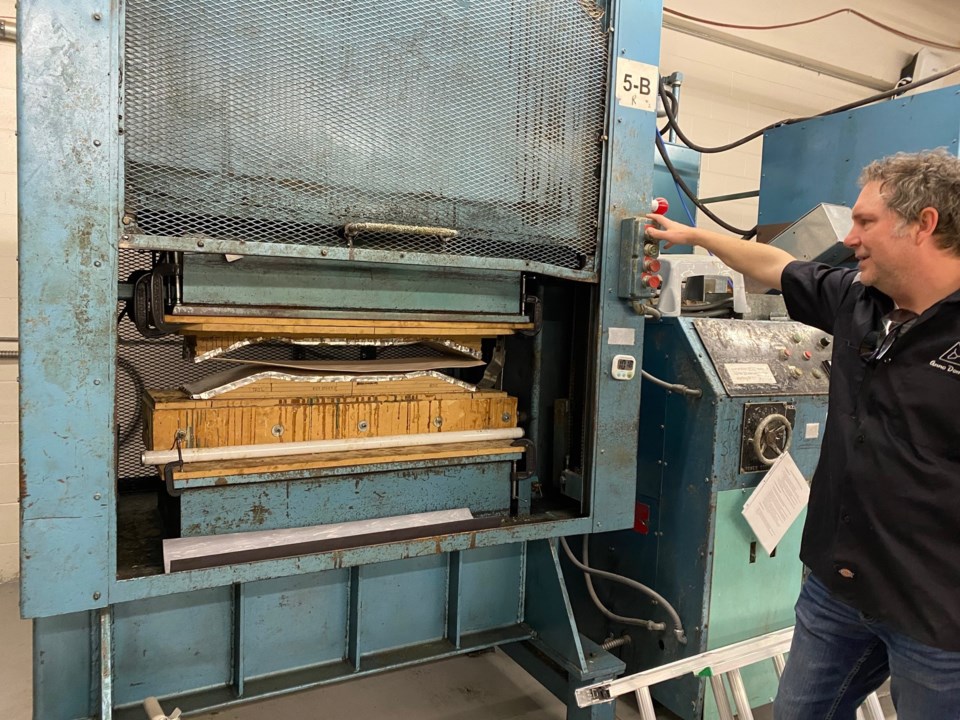 Anno Domini Chief Technical Officer David Mans demonstrates how layers of wood veneer are pressed together to Anno Domini skateboard decks. By Julie Baxter
Anno Domini Chief Technical Officer David Mans demonstrates how layers of wood veneer are pressed together to Anno Domini skateboard decks. By Julie BaxterAnother friend with contacts
The last member of the core team that makes up AD’s “fab five” with Harvey, Pepin, Mans and Burr is Kevin Ferman. Director of sales and marketing for Anno Domini, he knew Harvey from his time as a sales rep at sunglasses manufacturer, Glassy, which Harvey sold at his Ohio skate shop.
Ferman grew up in skateboarding mecca California and loved the sport.
“It was my whole life, it still is. It’s all I’ve ever cared about,” he said.
He lived his skateboarding dream in childhood and early adulthood and took up film making. He made four independent films, even taking first in the Skateboarding Film Fest. But as some friends turned pro and moved on and others turned to partying all the time, he said he was left feeling chewed up by the sport that revolved around a party lifestyle.
Getting sick of California, he took a summer trip to Colorado Springs in hopes of convincing his friends to move to the state. On a visit to the skatepark there he found himself in need of a skate tool. Who had it for him? Harvey.
He knew it was his old friend from Ohio after he said “Thanks, dude.” To which Harvey responded, “My name’s not dude.”
After a big hug, Harvey outlined the plans for Anno Domini and said the company needed a sales guy. Ferman said he “totally blew it off.”
None of his friends were interested in the move to Colorado, so in August he moved to Castle Rock solo for a fresh start. Shortly after he made the move, Harvey Facetimed him out of the blue, showing him the empty 10,000-square-foot warehouse, explaining the skateboard shortage and that AD had the means to make them.
He was in.
Ferman reached out to everyone he knew from his time at Glassy and from making skate videos and films, and in his first two weeks made $160,000 in sales.
Then he quickly pivoted to what he loves most about skateboarding — filming, editing, social media and team management.
“I got lots of new hats and it’s been a journey,” Ferman said.
A successful one, given that Mans said despite the supply shortages and bumps to be worked out at the startup, AD since officially starting sales in mid-December is seeing “$70,000 to $80,000 a month in revenue without even really trying.”
“As we continue to fine-tune our production processes and work through the normal startup challenges, we expect to ramp up quickly and I’d say we’re on track to be, at least within the United States, the largest manufacturer of skateboard decks within the next six months or less,” Mans said.
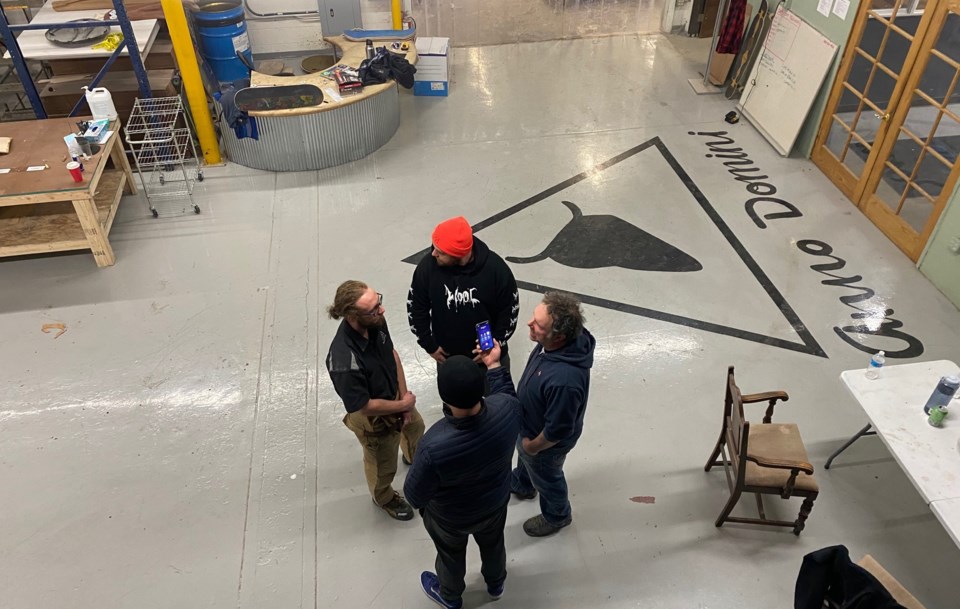 Four of the five core team members are Anno Domini Skateboards take a call in the Longmont warehouse and manufacturing space. Clockwise, starting with CEO David Harvey in the orange hat, Chief Technical Officer David Mans, Director of Sales and Marketing Kevin Ferman and Head of Production Austin Burr. . By Julie Baxter
Four of the five core team members are Anno Domini Skateboards take a call in the Longmont warehouse and manufacturing space. Clockwise, starting with CEO David Harvey in the orange hat, Chief Technical Officer David Mans, Director of Sales and Marketing Kevin Ferman and Head of Production Austin Burr. . By Julie BaxterExcited again
“It’s been crazy. A lot of businesses have problems, but to be honest, it’s been pretty easy to solve problems here,” Harvey said. “This business felt too easy to get to where we’re at. It was very quick, we had the right minds behind it, everything is working. We have professional skateboarders, the biggest manufacturers in the world know us and we didn’t even try. We worked hard but we didn’t try to put our name out there.”
Harvey and the other four of the fab five see the company as a “safe haven.”
“It’s a place of a second chance for people. A second chance at life. We have people here that are not proud of their past but we’re not judging them,” Harvey said.
The fab five, as well as the entire Anno Domini crew of about 25 workers, is now looking toward the future filled not only with building boards but building community.
“Our ultimate goal, being a Christian-based company, is to guide people into positivity. Allow people to know they’re forgiven for the things that they’ve done in life. Same as me. I’ve been forgiven for my sins to walk a better path in life,” Harvey said.
How a board is made
Anno Domini skateboard decks are made from layers of maple veneer that are glued together with the grain alternating for strength, and then loaded into a hydraulic press that forces the wood into shape. High-intensity radio frequency emitted by the press cures the glue in seven minutes versus three days in a “cold” press, David Mans said.
The wood is shaped, sanded, and painted with two coats of lacquer chemically designed to bond to the ink in graphics.
A heat transfer press is then used to apply graphics. Check out this video to see that process in action.
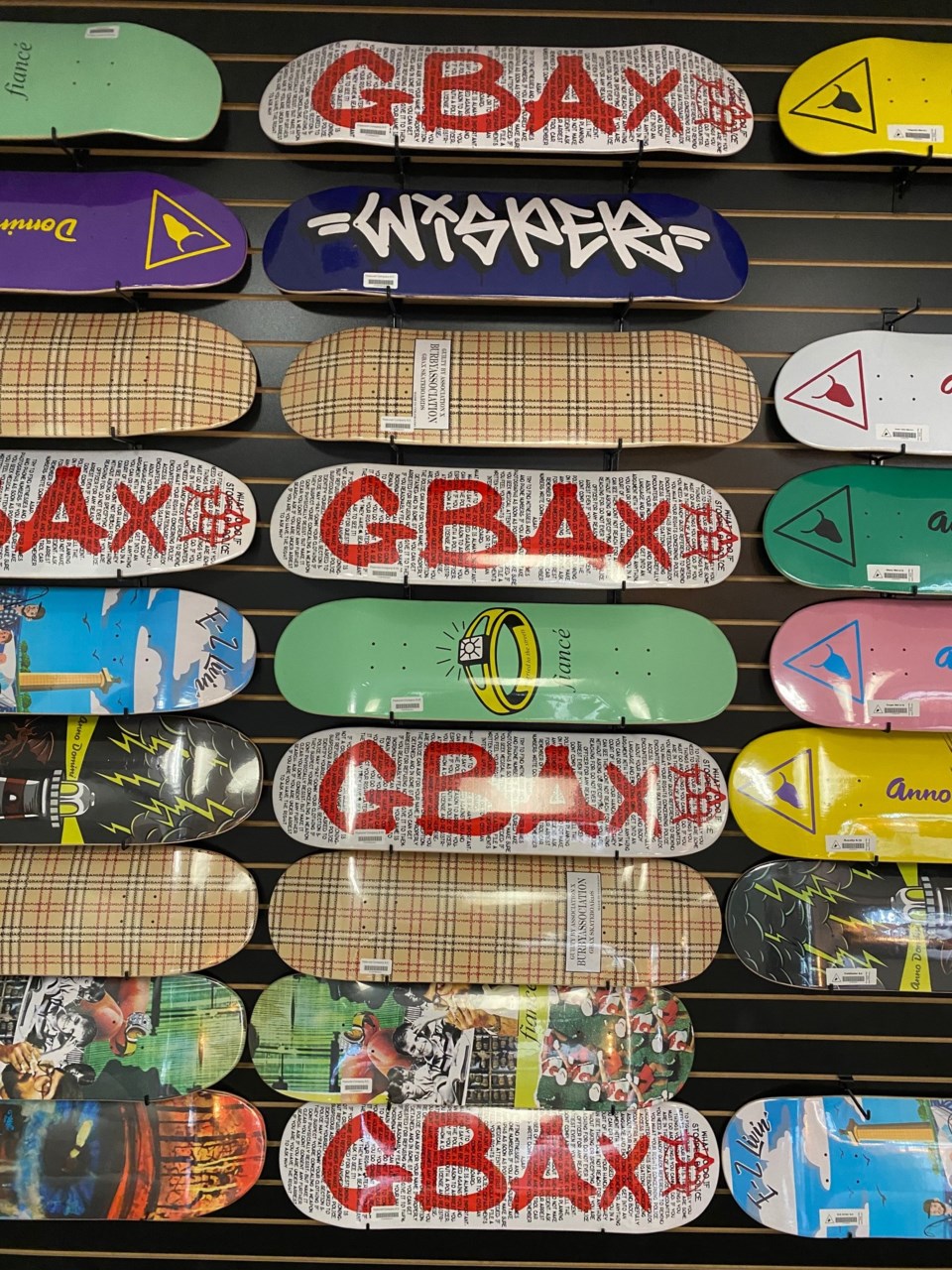 A collection of boards made at Anno Domini on display at the skate shop. By Julie Baxter
A collection of boards made at Anno Domini on display at the skate shop. By Julie Baxter***
Correction: Ausitn Burr's name was misspelled in the original posting of this story.
